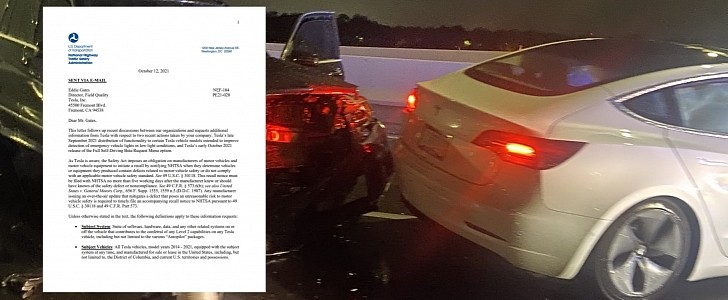NHTSA (National Highway Traffic Safety Administration) started investigating Tesla vehicles on Autopilot for crashing against emergency vehicles on August 13. The company quickly released an OTA (over-the-air) update that it claimed would solve the issue. Although we’re yet to confirm if that was the case, the agency did not seem to approve Tesla’s approach. According to a new letter to the company, NHTSA thinks it should have been a recall.
The chief of the Vehicle Defects Division, Gregory Magno, sent Eddie Gates an email message stating that. Tesla’s Director of Field Quality will have until November 1, 2021, to answer the information request. It concerns not only the software update 2021.24.12 released on September 21 but also the Full Self-Driving Beta Request Menu option, delivered through the software update 2021.32.22. However, it is the one related to emergency vehicles that apparently attracted more attention from NHTSA.
Magno states in the message that the Safety Act demands automakers “to initiate a recall by notifying NHTSA when they determine vehicles or equipment they produced contain defects related to motor vehicle safety.” He also mentions that over-the-air updates are also included among the measures that demand NHTSA is informed. If it “mitigates a defect that poses an unreasonable risk to motor vehicle safety,” the automaker has to “timely file an accompanying recall notice to NHTSA.”
Tesla will probably argue that the update was not a recall, just an enhancement of the beta software that failed to avoid crashes with emergency vehicles at least 11 times. It might also debate what a defect is: if its software is in the beta stage, which means it is not a stable release, can NHTSA frame it as a flaw?
This is going to be an interesting discussion. If Tesla uses the theory that beta software is not subject to defects, NTHSA may understand it should not have allowed regular customers to use it in the first place. That would impose Tesla to follow the same testing procedures of other car companies and only allow customers to access stable releases.
Let’s suppose Tesla accepts that the software had a defect that needed to be corrected. In that case, it will open the gates for lawsuits blaming the company for traffic incidents in which Autopilot or FSD were active but did not manage to prevent crashes, some of them fatal. For the company, we have no idea which situation would be worse. For customers, they may finally see Tesla taking some responsibility for how its ADAS operates, whatever course of action the company chooses.
Magno states in the message that the Safety Act demands automakers “to initiate a recall by notifying NHTSA when they determine vehicles or equipment they produced contain defects related to motor vehicle safety.” He also mentions that over-the-air updates are also included among the measures that demand NHTSA is informed. If it “mitigates a defect that poses an unreasonable risk to motor vehicle safety,” the automaker has to “timely file an accompanying recall notice to NHTSA.”
Tesla will probably argue that the update was not a recall, just an enhancement of the beta software that failed to avoid crashes with emergency vehicles at least 11 times. It might also debate what a defect is: if its software is in the beta stage, which means it is not a stable release, can NHTSA frame it as a flaw?
This is going to be an interesting discussion. If Tesla uses the theory that beta software is not subject to defects, NTHSA may understand it should not have allowed regular customers to use it in the first place. That would impose Tesla to follow the same testing procedures of other car companies and only allow customers to access stable releases.
Let’s suppose Tesla accepts that the software had a defect that needed to be corrected. In that case, it will open the gates for lawsuits blaming the company for traffic incidents in which Autopilot or FSD were active but did not manage to prevent crashes, some of them fatal. For the company, we have no idea which situation would be worse. For customers, they may finally see Tesla taking some responsibility for how its ADAS operates, whatever course of action the company chooses.


















